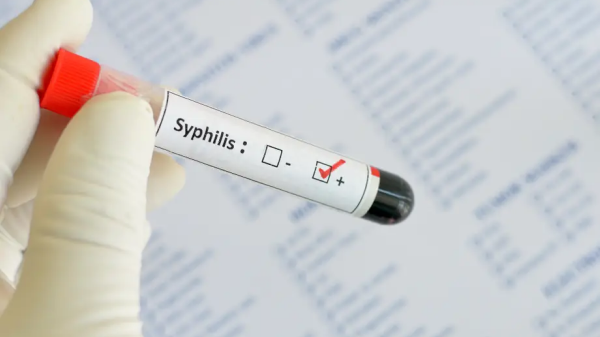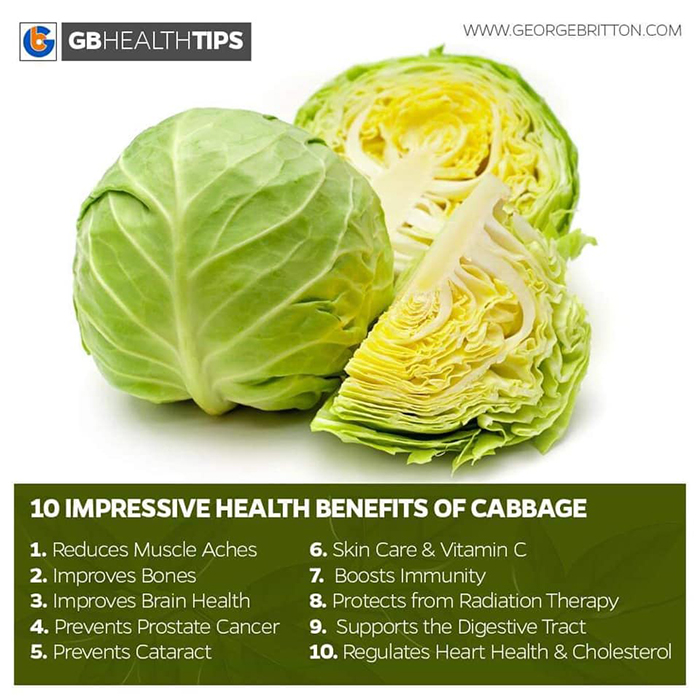The health benefits of cabbage include its frequent use as a treatment for constipation, stomach ulcers, headaches, obesity, skin disorders, eczema, jaundice, and scurvy. It also helps prevent or delay the onset of rheumatism, arthritis, gout, eye disorders, heart diseases, and Alzheimer’s disease.
What is Cabbage?
Cabbage is a leafy green, red, or white biennial vegetable which is grown annually. This cruciferous vegetable belongs to the Brassica family and is round or oval in shape. It consists of soft, light green or whitish inner leaves covered with harder and dark green outer leaves. It is widely used throughout the world and can be prepared in a number of ways, but most commonly, it is included as either a cooked or raw part of many salads. Cabbage belongs to the group of cole crops, which means that it is closely related to broccoli, cauliflower, and Brussels sprouts.
Types of Cabbage
There are more or less 7 varieties of cabbage, including the following:
Red cabbage
Choy sum
Bok choy
Savoy cabbage
Napa cabbage
Cannonball cabbage
January king cabbage
Nutrition
Cabbage is a very good source of manganese, dietary fiber, calcium, magnesium, and potassium. As per the USDA, it is also rich in various vitamins including vitamin C, B6, A, K, and E. With a 100 gram serving of cabbage containing about 25 calories, it proudly takes the title of a healthy addition to your diet. [1] It is also high in antioxidants including flavonoid, zeaxanthin, lutein, choline, and beta-carotene.
Health Benefits of Cabbage
Did you know that the inexpensive and widely used cabbage can practically work miracles? Let’s take the look at the best ones!
Antioxidant Agent
Cabbage acts as a good detoxifier too, meaning that it purifies the blood and removes toxins, primarily free radicals and uric acid which are the main causes of rheumatism, gout, arthritis, renal calculi, skin diseases, and eczema. This detoxifying effect of cabbage is due to the high content of vitamin C and sulfur in it.
Anti-inflammatory Agent
Research by Prof. Herbert Tilg suggests that cruciferous vegetables like cabbage have anti-inflammatory properties. [2] They contain sulforaphane, which is a compound that reduces inflammation.
Cabbage is also known to accumulate a build-up of cadmium-binding complexes in its leaves and one of the main components of that is glutamine. Glutamine is a strong anti-inflammatory agent, so consuming it can help to reduce inflammation, irritation, allergies, joint pain, fever, and various skin disorders.
Anticancer Properties
The Cancer Epidemiology, Biomarkers & Prevention journal has published a research study showing that brassica vegetables like cabbage contain relatively high content of glucosinolates, which have anti-carcinogenic properties. [3] This means that cabbage and other similar vegetables scavenge free radicals from the body, which can be detrimental to overall health and are major contributors to cancer and heart diseases.
It also contains glucosinolates that can be converted into isothiocyanate compounds. which help in the prevention of various cancers including breast cancer, prostate cancer, bladder cancer, and colon cancer.
Red cabbage also has a number of anti-cancer compounds like lupeol, sinigrin, and sulforaphane (glucosinolates derived isothiocyanate), which are known to stimulate enzyme activity and inhibit the growth of tumors that lead to cancer.
A study by Dr. Jane V. Higdon from the Linus Pauling Institute, Oregon State University, USA, performed primarily on Chinese women, showed a significant reduction in breast cancer when cruciferous vegetables like cabbage were regularly added to their diet. [4]
Supports the Digestive Tract
Cabbage, being rich in fiber and glucosinolates helps the body retain water and it maintains the bulkiness of the food as it moves through the bowels. A 2012 study published in the World Journal of Gastroenterology suggests that fiber, present in cabbage, helps bulk up the bowel movements and treat constipation. [5]
Roughage deficiency can be really fatal, but it is one that is commonly overlooked in the maintenance of personal health. A lack of roughage in food can result in constipation, which is the root cause of many other ailments such as stomach ulcers, headaches, gastrointestinal cancers, indigestion, and a subsequent loss of appetite. The dangers of roughage deficiency even extend to skin diseases, eczema, premature aging, and hundreds of mild to serious conditions.
Regulates Heart Health & Cholesterol
As per a study lead by Dr. Piotr Duchnowicz, Faculty of Biology and Environmental Protection, University of Łódź, Poland, cabbage is rich in polyphenols, which reduce the risk of cardiovascular diseases by lowering LDL cholesterol levels, reducing blood pressure, and preventing platelet build-up. [6] Also, by binding the bile acids, cabbage helps to lower your bad cholesterol levels.
Protects from Radiation Therapy
Cabbage has a rare compound called 3,3′-diindolylmethane (DIM), which has been shown to prevent the risks associated with radiation therapy. It helps in ensuring that the red and white blood cells and the platelet count remain existent, which is often not the case during radiation therapy. Therefore, DIM is also favored for use during cancer treatment in order to protect healthy tissue.
Boosts Immunity
Due to the high vitamin C content of cabbage, it helps in boosting the immune system and fighting off free radicals.
Skin Care & Vitamin C
Cabbage is rich in antioxidants, including vitamin C, anthocyanins, and sulfur, since it is a cruciferous vegetable. Antioxidants play a major role in skin health and the general toning and improvement of the body in response to the aging process. [7] Free radicals can be an underlying cause of wrinkles, skin discoloration, spots, and many other conditions. Therefore, the antioxidants you get by eating cabbage can cause a turn-around in your aging processes, leaving you feeling and looking healthy and young.
Weight Loss
Cabbage is frequently recommended for people who want to lose weight in a healthy way. Since cabbage is packed with many beneficial vitamins, minerals, and other nutrients, it is a healthy dietary option for people to eat and is quite filling since it has high levels of fiber, which add bulk to the bowels. It is also low in calories, amounting to only 33 calories in a cup of cooked cabbage. Therefore, people can go on the popular “cabbage soup” diet, and eat plenty of food to stay healthy, without gaining excess weight!
Prevents Cataract
Cabbage is a rich source of beta-carotene, so many people, particularly as they get older, turn to cabbage for its ability to prevent macular degeneration and promote good eye health and delay cataract formation. [8] [9]
Health benefits of cabbage
Hair Care
Cabbage, being rich in sulfur and silicon, helps in preventing dry hair. It also has a high vitamin A content that acts as an antioxidant and promotes hair growth.
Prevents Prostate Cancer
Cabbage has an abundant amount of beta-carotene. As per studies in the American Journal of Epidemiology [10], dietary beta-carotene has been positively linked to reduced chances [11] of prostate cancer, which is an extra bonus on top of other anti-carcinogenic effects of cabbage!
Improves Brain Health
Let’s not forget that cabbage is a very powerful brain food! The presence of vitamin K and anthocyanins within cabbage can give a strong boost to mental function and concentration. Vitamin K is essential for the production of sphingolipids, the myelin sheath around nerves. This wrapping is what protects the nerves from damage and decay. Therefore, consuming vitamin K can improve your defense against neural degeneration, Parkinson’s and Alzheimer’s disease, and dementia.
Furthermore, the anthocyanins in cabbage are a current area of research, but early indications point to it being a more powerful source of antioxidants than vitamin C, and red cabbage has even more types of anthocyanins than normal cabbage. It also appears that the nutrient uptake is not limited by anything and that people can eat as much cabbage as they want, and continue to accumulate antioxidants, which help fight off diseases, reduce chances of cancer, improve the nervous system, and increase brain function.
Cabbage, being rich in iodine, also helps in the proper functioning of the brain and the nervous system, along with keeping the glands of the endocrine system in proper condition.
Improves Bones
Cabbage, as well as all cruciferous vegetables, are great sources of minerals, like calcium, magnesium, and potassium. These three essential minerals are integral in the protection of bones from degradation and the onset of conditions like osteoporosis and general bone weakening.
Regulates Blood Pressure
Red cabbage happens to be a good source of anthocyanins. A study by Professor Ailsa A. Welch and her team states that “Higher anthocyanin intake is associated with lower arterial stiffness and central blood pressure in women.” Simply put, anthocyanin-rich cabbage helps lower blood pressure levels and prevents heart diseases. [12]
Also, the presence of potassium in cabbage also makes it a wonderful way to protect yourself from elevated blood pressure, which increases the risk of heart attack and stroke. Potassium is a vasodilator, which means that it opens up the blood vessels and eases the flow of blood, so it isn’t being forced in a stress-inducing way through constricted arteries and veins. Overall, cabbage is a great shield against many types of dangerous conditions!
Reduces Muscle Aches
When certain bacteria ferment the sugars in cabbage during the preparation of sauerkraut, lactic acid is released. [13] It isn’t the easiest compound to find in a diet, but it has been shown to reduce muscle soreness and aches. So in some small way, cabbage can help in general pain relief and muscle soreness, depending on how it is prepared.
Speeds-up Healing
Cabbage is rich in sulfur, which is a very useful nutrient as it fights infections. A deficiency of sulfur can result in microbial infections and a greatly reduced healing speed. It also reduces the frequency and severity of ulcers.
Other benefits
Cabbage can also be used for the treatment of varicose veins, leg ulcers, and peptic and duodenal ulcers.
Basically, this common component of your Chinese dishes could be a miraculous addition to your diet. Don’t be afraid to add cabbage to your daily diet, whether it is in your soup or salad, and that small change will help you live a healthier and longer life.
Uses of Cabbage
Cabbage can be used in various culinary uses and can be incorporated into our daily diet in the following ways:
Salads: Cabbage can be shredded into salads with salt and other spices.
Soups: It can also be boiled into a soup and served hot.
Stews: It can be served raw or steamed into a stew with water and salt.
Side effects
Cabbages can also have a few side effects on your body, including the following:
Bloating
Foodborne illness
Goiter
Iodine intake
Flatulence
Diarrhea
Drop in blood sugar levels
Colic
Aside from these issues, cabbage is one such vegetable that can be added to any number of dishes and still be enjoyed just the same with its amazing health benefits. So don’t forget to add it to your cart next time you go grocery shopping!































































































